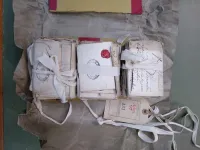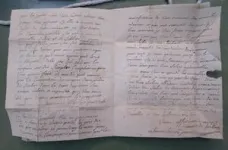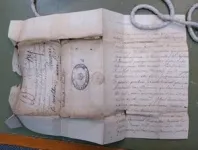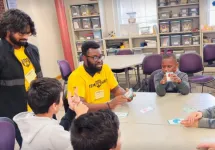(Press-News.org) UNDER STRICT EMBARGO UNTIL 19:01 (US ET) ON MONDAY 6TH NOVEMBER 2023 / 00:01AM (UK TIME) ON TUESDAY 7TH NOVEMBER 2023
Over 100 letters sent to French sailors by their fiancées, wives, parents and siblings – but never delivered – have been opened and studied for the first time since they were written in 1757-8.
The messages offer extremely rare and moving insights into the loves, lives and family quarrels of everyone from elderly peasants to wealthy officer’s wives.
The messages were seized by Britain’s Royal Navy during the Seven Years’ War, taken to the Admiralty in London and never opened. The collection is now held at the National Archives in Kew.
The letters provide precious new evidence about French women and labourers, as well as different forms of literacy.
“I could spend the night writing to you … I am your forever faithful wife. Good night, my dear friend. It is midnight. I think it is time for me to rest.”
So wrote Marie Dubosc to her husband, the first Lieutenant of the Galatée, a French warship, in 1758. She didn’t know where Louis Chambrelan was, or that his ship had been captured by the British. He would never receive her letter and they would never meet again. Marie died the following year in Le Havre, almost certainly before Louis was released. In 1761, he remarried, safely back in France.
“I cannot wait to possess you” wrote Anne Le Cerf to her husband, a non-commissioned officer on the Galatée. She perhaps meant “embrace” but also “to make love to you”. She signed “Your obedient wife Nanette”, an affectionate nickname. Imprisoned somewhere in England, Jean Topsent would never receive Nanette’s love letter.
Professor Renaud Morieux, from Cambridge University’s History Faculty and Pembroke College, spent months decoding these and 102 other letters written with wild spelling, no punctuation or capitalization and filling every inch of the expensive paper they appear on. He published his findings today in the journal Annales. Histoire, Sciences Sociales.
“I only ordered the box out of curiosity,” Morieux said. “There were three piles of letters held together by ribbon. The letters were very small and were sealed so I asked the archivist if they could be opened and he did. I realized I was the first person to read these very personal messages since they were written. Their intended recipients didn’t get that chance. It was very emotional.”
“These letters are about universal human experiences, they’re not unique to France or the 18th century. They reveal how we all cope with major life challenges. When we are separated from loved-ones by events beyond our control like the pandemic or wars, we have to work out how to stay in touch, how to reassure, care for people and keep the passion alive. Today we have Zoom and WhatsApp. In the 18th century, people only had letters but what they wrote about feels very familiar.”
Captured and out of luck
During the Seven Years’ War (1756–1763), France commanded some of the world’s finest ships but lacked experienced sailors. Britain exploited this by imprisoning as many French sailors as it could for the duration of the war. In 1758, out of 60,137 French sailors, a third (19,632) were detained in Britain. Across the period of the Seven Years' War as a whole, there were 64,373 French sailors imprisoned in Britain.
Some of these men died from disease and malnutrition, but many others were released. In the meantime, their families waited and repeatedly tried to contact them and exchange news.
Morieux said: “These letters show people dealing with challenges collectively. Today we would find it very uncomfortable to write a letter to a fiancée knowing that mothers, sisters, uncles, neighbours would read it before it was sent, and many others would read it upon receipt. It’s hard to tell someone what you really think about them with people peering over your shoulder. There was far less of a divide between intimate and collective.”
In the 18th century, sending letters from France to a ship, a constantly moving target, was incredibly difficult and unreliable. Sometimes people sent multiple copies of letters to different ports hoping to reach a sailor. Relatives also asked the families of crewmates to insert messages to their loved-one in their letters. Morieux found extensive evidence of these strategies in the Galatée letters which like so many others, never reached their intended recipients.
The Galatée was sailing from Bordeaux to Quebec when, in 1758, it was captured by the British ship, the Essex, and sent to Portsmouth. The crew was imprisoned and the ship sold.
The French postal administration had tried to deliver the letters to the ship, sending them to multiple ports in France but always arrived just too late. When they had heard that the ship had been captured, they forwarded the letters to England, where they were handed to the Admiralty in London.
“It’s agonising how close they got,” Morieux said. Morieux believes that officials opened and read two letters to see if they had any military value but deciding they only contained “family stuff”, gave up and put them into storage.
Morieux identified every member of the Galatée’s 181-strong crew from simple sailors to carpenters to superior officers. The letters were addressed to a quarter of them. Morieux carried out genealogical research into these men and their correspondents to learn more about their lives than the letters alone revealed.
Quarrels and tensions
The letters convey both romantic love and more often family love, but also offer rare insights into family tensions and quarrels at a time of war and prolonged absence. Some of the most remarkable letters were sent to the young sailor, Nicolas Quesnel, from Normandy. On 27 January 1758, his 61-year-old mother, Marguerite – who was almost certainly illiterate – sent a message written by an unknown scribe to complain:
“On the first day of the year [i.e. January 1st] you have written to your fiancée […]. I think more about you than you about me. […] In any case I wish you a happy new year filled with blessings of the Lord. I think I am for the tomb, I have been ill for three weeks. Give my compliments to Varin [a shipmate], it is only his wife who gives me your news.”
A few weeks later, Nicolas’ fiancée, Marianne, wrote to instruct him to write to his mother to be a good son and stop putting her in an awkward situation. It seems that Marguerite had blamed Marianne for Nicolas’ silence. Marianne wrote: “the black cloud has gone, a letter that your mother has received from you, lightens the atmosphere.”
But on 7th March 1758, Marguerite wrote to Nicolas again to complain: “In your letters you never mention your father. This hurts me greatly. Next time you write to me, please do not forget your father.”
Morieux discovered that, in fact, this man was Nicolas’ step-father. His biological father had died and his mother remarried.
“Here is a son who clearly doesn’t like or acknowledge this man as his father,” Morieux said. “But at this time, if your mother remarried, her new husband automatically became your father. Without explicitly saying it, Marguerite is reminding her son to respect this by sharing news about “your father”. These are complex but very familiar family tensions.”
Nicolas Quesnel survived his imprisonment in England and, Morieux found, joined the crew of a transatlantic slave trade ship in the 1760s.
Women in wartime
Over half (59%) of the letters were signed by women and provide precious insights into female literacy, social networks, and experiences in wartime.
“These letters shatter the old-fashioned notion that war is all about men,” Morieux said. “While their men were gone, women ran the household economy and took crucial economic and political decisions.”
In this period, the French navy manned its warships by forcing most men living near the coast to serve for 1 year, every 3 or 4 years. This system was as unpopular as press-ganging in Britain and many French sailors ran away once in port or applied to be released on the basis of injury.
The sister of Nicolas Godefroy, a trainee pilot, wrote: “What would bring me more pain is if you leave for the islands”. She meant the Caribbean where thousands of European sailors died from disease in this period. Nevertheless, Godefroy’s sister and mother both refused to apply for his release from the navy. They feared that his proposed strategy could backfire and force him to stay at sea “even longer”.
Who are you calling illiterate?
Morieux’s study calls for a more inclusive definition of literacy.
“You can take part in a writing culture without knowing how to write nor read,” he said. “Most of the people sending these letters were telling a scribe what they wanted to say, and relied on others to read their letters aloud. This was someone they knew who could write, not a professional. Staying in touch was a community effort.”
References
R. Morieux, ‘Lettres perdues Communautés épistolaires, guerres et liens familiaux dans le monde maritime atlantique du xviiie siècle’, Annales. Histoire, Sciences Sociales (2023). DOI: 10.1017/ahss.2023.75
The National Archives, ADM 97/131: ‘Letters to prisoners of war mostly addressed to the crew of the Galatea at Rochefort and forwarded to England (1757–1758)’
Media contacts
Tom Almeroth-Williams, Communications Manager (Research), University of Cambridge: researchcommunications@admin.cam.ac.uk / tel: +44 (0) 7540 139 444
Professor Renaud Morieux, University of Cambridge: rm656@cam.ac.uk
END
French love letters confiscated by Britain finally read after 265 years
2023-11-07
ELSE PRESS RELEASES FROM THIS DATE:
First in human trial of new drug raises hopes for patients with relapsed blood cancer
2023-11-06
COLUMBUS, Ohio – A new targeted drug, studied by researchers at The Ohio State University Comprehensive Cancer Center – Arthur G. James Cancer Hospital and Richard J. Solove Research Institute (OSUCCC – James), may offer a new treatment option for patients with blood cancers, including chronic lymphocytic leukemia (CLL) and Non-Hodgkin lymphoma (NHL) whose disease has stopped responding to standard treatments.
In the first clinical trial of this drug in humans, nemtabrutinib ...
A cutting-edge approach to tackling pollution in Houston and beyond
2023-11-06
With its notoriously hot and humid climate and robust industrial environment, Houston is one of the most ozone-polluted cities in the United States. Now, a University of Houston research team is integrating the power of machine learning (ML) with innovative analysis techniques to pinpoint the city’s air pollution sources more accurately.
While the ozone layer in the stratosphere protects the Earth, and us, from the harmful rays of the sun, it’s also a major pollutant that can be harmful to human health when it’s closer to the ground. Long-term exposure to surface ozone can cause difficulty breathing, worsen asthma and increase the ...
The last turn of ‘Ezekiel’s Wheel’ honors a Yale-affiliated fossil hunter
2023-11-06
New Haven, Conn. — The mystery of Ezekiel’s Wheel — the extinct sea creature, not the Biblical vision — may have taken its final turn, thanks to Yale paleontologists.
In so doing, the researchers have also finally put a scientific name to the favorite fossil of a beloved amateur fossil hunter.
Samuel J. Ciurca Jr., who died in 2021, was a curatorial affiliate of the Yale Peabody Museum for many years. He collected tens of thousands of fossils, primarily from the Silurian rocks of upstate New York and southern Ontario, Canada.
He donated more than 11,000 ...
STEM Career Days boost high school students’ career aspirations in STEM fields, MU study finds
2023-11-06
COLUMBIA, Mo. – A new study at the University of Missouri — in partnership with Harvard-Smithsonian researchers — shows that when colleges host ‘STEM Career Days,’ the students who attend are far more likely to pursue a career in a STEM (Science, Technology, Engineering and Math) related field.
The findings not only highlight the benefits of college recruiters introducing high school students to STEM-related opportunities, but they can also help increase and diversify ...
Ochsner Health and Chevron partner for a third consecutive year to offer smoking cessation and education program
2023-11-06
NEW ORLEANS, La. – Chevron and Ochsner Health continue to offer their Lung Cancer Awareness, Education and Prevention Program for a third consecutive year thanks to a $50,000 donation from Chevron. The program will be offered in Jefferson Parish for the first time and continue to reach community members in St. Tammany, East Baton Rouge, West Baton Rouge, Ascension, St. Charles, Terrebonne, and Lafourche parishes.
Ochsner Health and Chevron formed a key partnership for the Lung Cancer Awareness, Education and Prevention Program to improve lung health and overall wellness. ...
Patients more likely to lose weight if physicians offer advice using optimistic tone
2023-11-06
Embargoed for release until 5:00 p.m. ET on Monday 6 November 2023
Annals of Internal Medicine Tip Sheet
@Annalsofim
Below please find summaries of new articles that will be published in the next issue of Annals of Internal Medicine. The summaries are not intended to substitute for the full articles as a source of information. This information is under strict embargo and by taking it into possession, media representatives are committing to the terms of the embargo not only on their own behalf, but also on behalf of the organization they represent.
----------------------------
1. Patients more likely to lose weight if physicians offer advice using optimistic tone
Abstract: ...
Deploying sensor nets to measure ocean CO2 and pH from the surface to the depths
2023-11-06
Researchers at the University of Pittsburgh Swanson School of Engineering, in collaboration with the National Energy Technology Laboratory, are among 11 projects in eight states selected to receive a combined $36 million to accelerate the development of marine carbon dioxide removal (mCDR) capture and storage technologies.
The funding from the U.S. Department of Energy Advanced Research Projects Agency-Energy (ARPA-E) is part of the ARPA-E Sensing Exports of Anthropogenic Carbon Through Ocean ...
Passion for vascular disease research yields $5 million in NIH funding for Yabing Chen
2023-11-06
BIRMINGHAM, Ala. – Yabing Chen, Ph.D., has been awarded two National Institutes of Health grants totaling more than $5 million to further her research into vascular diseases ranging from hardening of the arteries to dementia.
Vacuolar calcification, which leads to the hardening of blood vessels and increased vascular stiffness, is a hallmark of the aging process in the cardiovascular system. As early as the mid-1600s, physician Thomas Sydenham noted that “a man is as old as his arteries.” Chen expands that to include two different disease processes. “I like ...
Study shines light on the health of American moms in the year after birth
2023-11-06
Maternal mortality in the U.S. is on the rise and more than half of maternal deaths occur in the postpartum year. A study by Columbia University Mailman School of Public Health and the School of Social Work provides insights into the challenges that birthing people face in the year after birth - both medical and social - which could be drivers of postpartum morbidity and mortality. The study is the first large scale and representative survey of postpartum health ever conducted in the U.S. The findings ...
Firearm injuries among children and adolescents lead to huge mental and behavioral health consequences
2023-11-06
BOSTON – The alarming increase in firearm injuries to children and adolescents in the United States has taken an enormous mental and behavioral health toll on victims, survivors, and their families, with ripple effects on the economy and health care spending, researchers from Massachusetts General Hospital (MGH) and Harvard Medical School (HMS) have found.
In a study published in the November Issue Health Affairs, the team cited the substantial opportunities for improvements in clinical practice for survivors of gun violence and their family members, such as improved screening for mental and behavioral health needs, as well as enhanced educational programs for the ...






